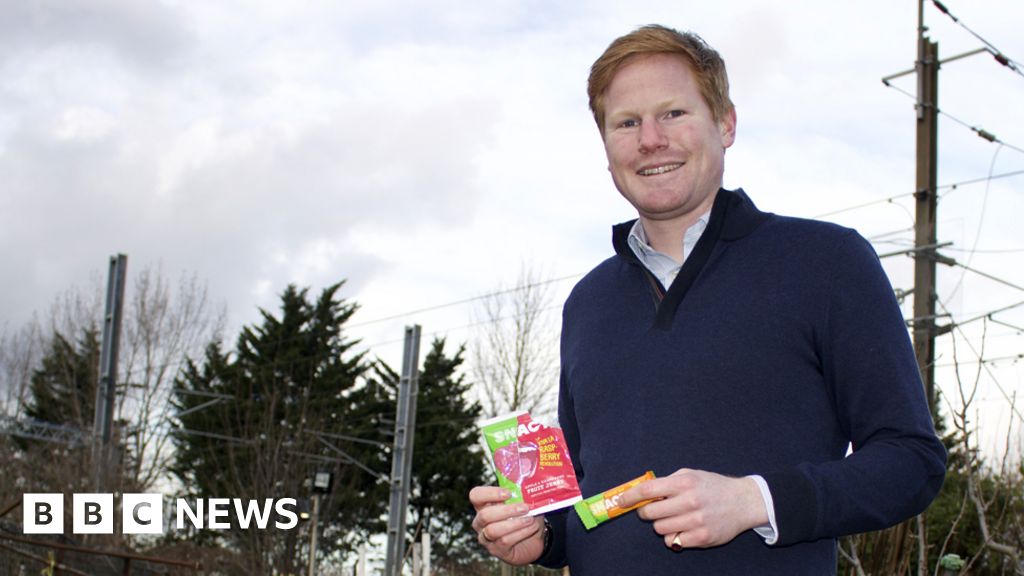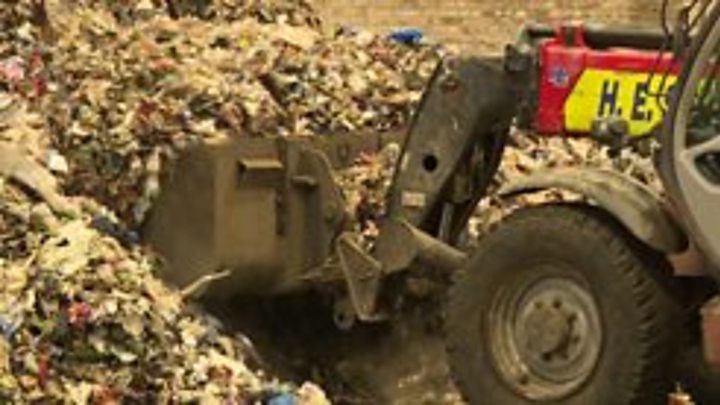Rotten Ideas


Plastic is one of the world's favourite packaging materials - it's cheap, practical and hard wearing. But its durability is part of the problem. Plastic pollution is now a huge issue and consumers are increasingly demanding greener alternatives. So how are companies responding to the pressure?
From chocolate biscuits to toothpaste, razors to cigarettes, low-cost products wrapped in plastic line supermarket shelves around the world.
The short lifespan and high turnover of these items mean they are a major culprit when it comes to single-use plastic - packaging used just once before being thrown away.
For those trying to cut down on their use of plastic, a trip to the supermarket can be a depressing affair. But some manufacturers are finding solutions to the problem.
For example, Tipa is an Israeli company that makes compostable plastic packaging. It features a multi-layer film made out of plant-based polymers which disintegrates in the heat and humidity of a home compost heap.
British firm Snact, which sells fruit snacks made from food waste, uses Tipa's "bioplastic" packaging.
"Just like traditional packaging, we have multiple layers in the film," explains Snact co-founder Michael Minch-Dixon.
"One [layer] we print on and that gives all the brand information, and then the other layer is what acts as the barrier, so that keeps out the moisture and the air and makes sure the food stays fresh and safe to eat."
He says the material is almost indistinguishable from conventional plastic ,but even the inks and glue are fully home-compostable.
"So we can just put it in the compost bin, and like an orange peel it will decompose in about six months' time," he says.
Mr Minch-Dixon says the cost of using the Tipa packaging for his products has fallen by 60% in two years, as more companies have adopted it. This means the snacks cost him just 1p more per item to produce than if he'd used traditional plastic.
In October, Tipa secured $11m (£9m) in new investment. Among the investors was the American-Uruguayan fashion designer Gabriela Hearst, who announced that she will start using Tipa packaging for her luxury clothing line.
Oiling the wheels
While Tipa's compostable packaging provides one solution, other companies are developing new ways of recycling conventional plastic.
British firm Recycling Technologies has built a machine that converts all flexible plastics into crude oil.
The RT7000 shreds and dries waste items including toothpaste tubes, crisp packets and confectionary wrappers, then subjects the plastic to extreme heat in a chamber with no oxygen.
That allows a chemical process called thermal cracking to occur, where the bonds in the plastic break down.
Recycling Technologies chief executive Adrian Griffiths says the oil that's produced can be sold to petrochemical companies and turned back into plastic.
"Anybody owning this machine can turn a waste product into something which attracts a high revenue," he says.
Recycling Technologies has just raised $1.4m (£1m) in investment funding from InterChem, a company that supplies petrochemical firms with raw materials.
Mr Griffiths aims to mass-produce the 20ft (6m)-tall machine - which can be transported in shipping containers - and sell it around the world.

Media playback is unsupported on your device
"We're building a facility to make 200 machines a year," he says. "Each machine will recycle 7,000 tonnes of plastic each year. That will add 1.4 million tonnes of recycling capacity into the system."
To put that in context, Europe currently recycles just three million tonnes of plastic a year. Much more ends up in landfill, is incinerated, or finds its way into the oceans.
"We envisage this machine sitting alongside rivers in Asia," says Mr Griffiths. "We'd be able to pay for people to get the plastic out of the river and bring it to the machine."
Seeing clearly
Rigid plastic items, like shampoo bottles, are already widely recycled. But the system is not as efficient as you might think.
When coloured plastics are mixed together for recycling, the resulting plastic is very low-grade and is not suitable for many uses.
For this reason Belgium-based Ecover, which makes household cleaning products, made the design choice to use only white or transparent plastic, so that its bottles can be recycled over and over again.
"At the moment all those coloured bottles which manufacturers are using, they are recyclable but what usually happens is they're recycled into park benches or plant pots - a full stop in the recycling stream," says David Kennedy of Ecover.
"We use clear plastic because it's the most recyclable plastic available we can find."
Many product designers think they have to use coloured plastic to differentiate their product on the shelf, says Mr Kennedy.
"But in reality, consumers are willing to accept they don't have to have coloured plastic," he says. "There are other ways you can highlight your brand - using shrinkable sleeves or using label language to make sure your brand stands out.
"If everyone was using transparent plastic that would be a hell of a lot better for the recycling of plastic globally."
Eleven of the world's biggest consumer goods companies, including Unilever, Coca-Cola, PepsiCo, Mars, L'Oréal and Walmart, have pledged to use only reusable, recyclable or compostable packaging by 2025.
Between them, they are responsible for producing six million tonnes of plastic packaging a year.
More Technology of Business
Rob Opsomer at the Ellen MacArthur Foundation, an organisation campaigning for sustainable industrial practices, believes it's critical that companies not only change the design of their packaging so that it's more sustainable, but that they work with local authorities to ensure their packaging does get recycled or composted and doesn't end up in landfill.
"Companies have a role and responsibility to help resolve the issue because they're the ones that make and use these plastics to package their products," says Mr Opsomer.
"But companies can't do it alone. We need government action as well."
From Chip War To Cloud War: The Next Frontier In Global Tech Competition
The global chip war, characterized by intense competition among nations and corporations for supremacy in semiconductor ... Read more
The High Stakes Of Tech Regulation: Security Risks And Market Dynamics
The influence of tech giants in the global economy continues to grow, raising crucial questions about how to balance sec... Read more
The Tyranny Of Instagram Interiors: Why It's Time To Break Free From Algorithm-Driven Aesthetics
Instagram has become a dominant force in shaping interior design trends, offering a seemingly endless stream of inspirat... Read more
The Data Crunch In AI: Strategies For Sustainability
Exploring solutions to the imminent exhaustion of internet data for AI training.As the artificial intelligence (AI) indu... Read more
Google Abandons Four-Year Effort To Remove Cookies From Chrome Browser
After four years of dedicated effort, Google has decided to abandon its plan to remove third-party cookies from its Chro... Read more
LinkedIn Embraces AI And Gamification To Drive User Engagement And Revenue
In an effort to tackle slowing revenue growth and enhance user engagement, LinkedIn is turning to artificial intelligenc... Read more

